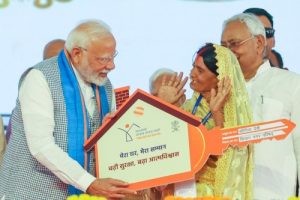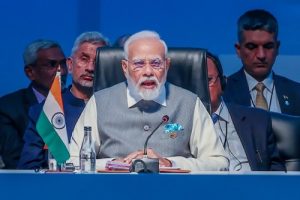The world body is firmly committed to fighting terrorism and all member countries have agreed it is an urgent issue, according to Tijjani Muhammad-Bande, the president of the UN General Assembly.
Counter-terrorism “is the one element that all agreed as urgent” and the UN has developed ways to facilitate it, he said in an exclusive interview to IANS.
Asked about the inability of UN members to come up with a Comprehensive Convention on International Terrorism, Muhammad-Bande said, “You may not have had what you all a convention. Definition questions may have stalled this but in truth, UN has led in the fight against terror.”
“In practical terms,” he said, “the United Nations has a very strong body of practices and rules relating to the war on terror.”
He cited the work of the Under-Secretary-General for Counter-Terrorism, Vladimir Voronkov, and his office.
The UN Office of Counter-Terrorism set up by the General Assembly in 2017 “brings together heads of intelligence agencies around the world to discuss what methods and rules should help and it is the one element that all agreed as urgent,” Muhammad-Bande said.
“It is a very important element of the world system,” he added during a video-teleconference conducted in New York because of the lockdown of the UN headquarters due to the COVID-19 pandemic.
The Convention proposed by India in 1996 has stalled over differences on defining acts of terrorism and terrorists as some countries claim certain actors as “freedom-fighters.”
However, the UN has managed to adopt three conventions dealing with the suppression of terrorist bombings; financing of terrorism, and acts of nuclear terrorism.
Muhammad-Bande, 62, who was unanimously elected president of the General Assembly was an educator and strategic thinker before he became a diplomat of Nigeria.
The reform of the Security Council, which has also stalled in the General Assembly for about two decades, Muhammad-Bande said was one of the most difficult tasks because of the need for getting a consensus of the General Assembly as well as of the five permanent members of the Council who have veto powers.
“It has taken longer than anybody had thought, had wanted,” he said.
The General Assembly “went through this very well during the beginning of this session, but the current situation of meetings being difficult to conduct, negotiations are extremely tough and it is certainly easier to conduct them in person and that has delayed some of the achievements of the current process”, he said.
The reform issues to be resolved include determining the size of an enlarged Council for effective performance, the regional representation and its membership, and whether the veto itself will remain and, if it does remain, is it going to be amended, he said.
About the relationship between the General Assembly and the Council, he said, “The United Nations Security Council is the Security Council of the United Nations, is not a standalone issue. It must feed and learn from what the organs are doing and move in the same direction.”
“The General Assembly is most representative because every member state has an equal vote, equal voice and collegiality,” he said.
He said, “The main organs must cooperate to get the work of the United Nations done. They may have different remits, but none is a system just unto itself.”

























Add Comment